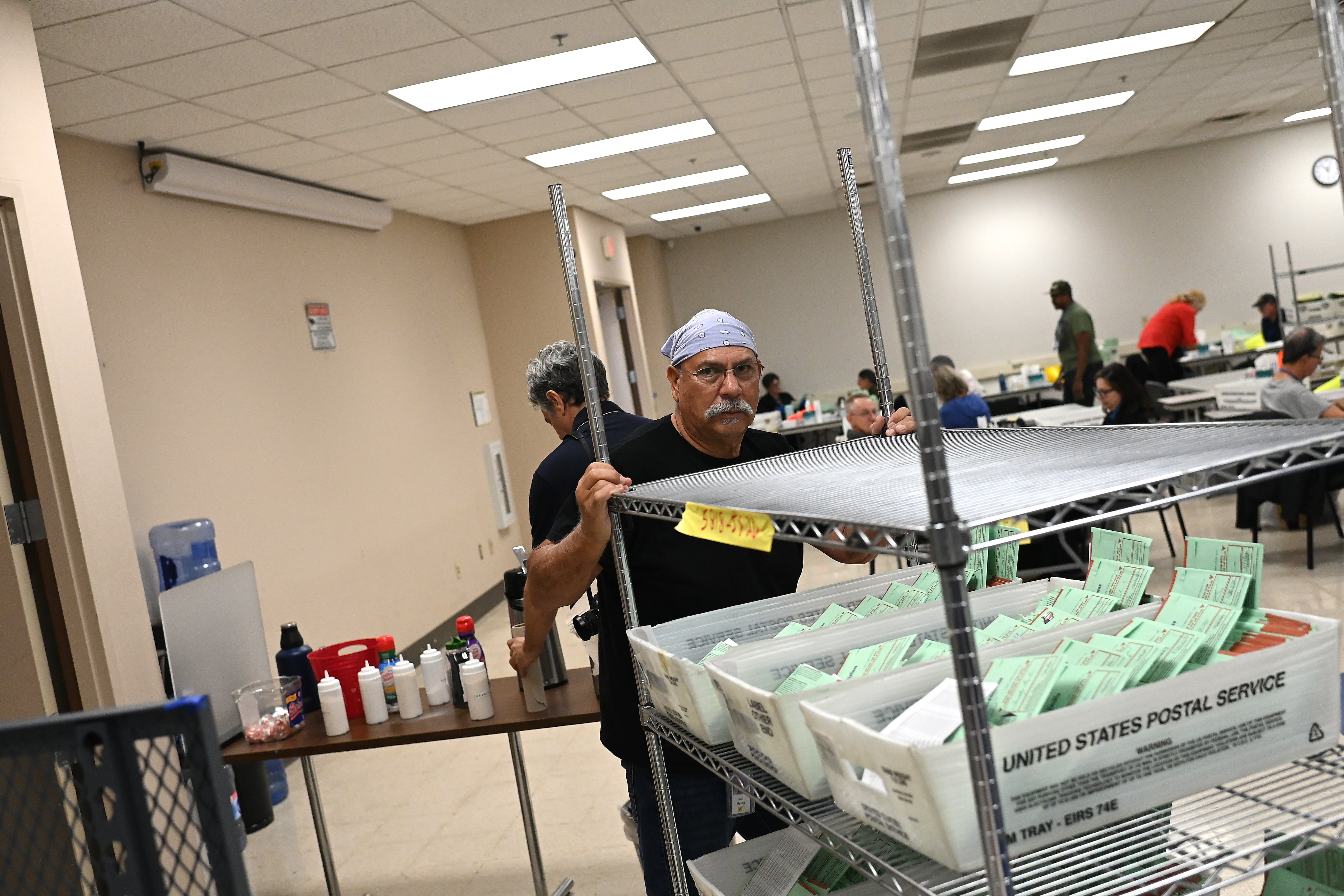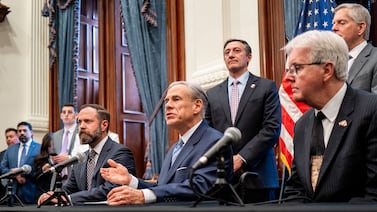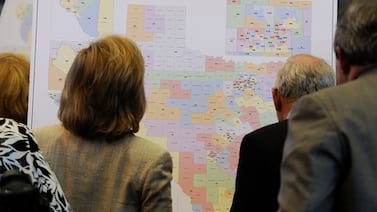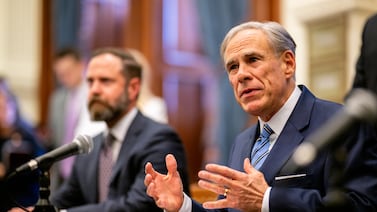Every seat in the small lobby of the election headquarters was filled. With video cameras rolling and reporters kneeling on the floor, Maricopa County Supervisors Chairman Bill Gates apologized.
“We will learn from it and do better,” Gates said, suited up behind a makeshift podium on Nov. 9, the windows behind him offering a glimpse into the tabulation center. The day prior, on Election Day, thousands of voters encountered machines at vote centers that wouldn’t scan their ballots.
Despite months of preparation for the 2022 midterms, Maricopa County couldn’t pull off a perfectly smooth election. Other counties made headlines for their election woes as well, although some of the controversy was manufactured. Cochise County supervisors refused to certify its election. Candidates demanded votes be counted faster, even though votes were being counted on schedule. Voter intimidation complaints rolled in about drop box watchers.
At the heart of all the controversies are lessons that, if seized upon in 2023, could enable Gates and other officials to “do better” and make Arizona elections stronger.
As the legislative session begins, among those thinking about potential changes are Democratic Governor Katie Hobbs, sworn in last week. Hobbs is likely to block extreme measures from Republican lawmakers that would upend voting, such as ending early voting or the use of vote-counting machines. Those measures are likely at least to be discussed, with far-right Sen. Wendy Rogers now leading the Senate’s elections committee.
In an interview with Votebeat shortly before taking office, Hobbs laughed when asked if Arizonans should expect to see lots of vetos from her.
“I can’t imagine Wendy Rogers and I agree on much related to elections,” she said, “So we will just have to see what is able to get out of not just her committee but the Senate in general. I certainly am not going to support election changes that negatively impact voters and aren’t supported by the folks administering elections.”
But, she said, state leaders owe it to voters to consider changes that make sense.
“Obviously, we should look at things that come up, and make changes that make the process better,” Hobbs said on one of her final days as secretary of state.
Hobbs said she might get behind certain changes that would make it so election results come faster, that might better ensure election equipment works properly, and that might protect elections from political maneuvering.
Here’s some of the problems — or perceived problems — that became hot topics in 2022, the solutions that may be proposed, and where Hobbs and others stand.
Problem: It takes too long to get election results
Republican candidates made one thing clear in 2022: They want election results faster.
One of the main reasons it takes so long to report results in Arizona — nearly two weeks in Maricopa County — is voters are allowed to drop off mail-in ballots, signed and sealed in their envelopes, at vote centers and in drop boxes on Election Day. Workers then need to scan those envelopes, verify their signatures, and count the votes. That takes days in most counties, especially as the number of voters using this Election Day option continues to increase.
Not everyone thinks this is a problem. Hobbs said lawmakers should make any changes carefully, considering both how the changes would be implemented and how they would affect voters.
County recorders Patty Hansen in Coconino County and Gabriella Cázares-Kelly in Pima County say it’s more important to count votes accurately than to count quickly. And they are there to serve voters, not candidates.
“This type of agenda is really appeasing campaigns, but elections are for the people,” Cázares-Kelly said.
Solution 1: End early ballot drop-offs
Maricopa County Recorder Stephen Richer said one solution he supports is prohibiting voters from dropping off early ballots on Election Day. About 290,000 voters cast their ballots this way in November. He would support ending those drop-offs at 5 p.m. the Friday before the election. That would give elections officials more time to process the ballots before Election Day.
Yavapai County Recorder Michelle Burchill says that idea is one she could get behind. “Late early ballots are a huge headache,” she said. It took her county’s small team two or three days to process them in the most recent election – while the same Republican leaders who encouraged voters to wait to drop off their ballots demanded that officials count faster.
“It would give us that breathing room, and enforce — if you’re going to vote early, vote early,” Burchill said.
There are obvious downsides to this proposal, and not everyone agrees with it. Hobbs said she does not support such an extreme deadline change. It would limit early voting, she said, require significant process changes and voter education, and may lead to “lots of rejected ballots.”
“So, on the surface, I don’t think that’s a good idea,” Hobbs said.
Cázares-Kelly says the idea is “extremely devastating for rural communities, tribal communities, and other places where it takes longer for the ballot to get to them.”
Pima County encompasses Tucson but also many rural and tribal areas, where mail-in ballots take longer to receive and send, and where it can take an hour to get to an early voting site. Eliminating part of the early voting drop-off period would significantly restrict voting for these communities, Cázares-Kelly said.
Solution 2: Change the rules for voters dropping off ballots
The Arizona Association of Counties, which represents county leaders such as recorders and election officials, supports another idea that’s less severe but would still change the rules for voters who want to drop off their mail-in ballot on Election Day.
The policy would require voters who drop off early ballots to bring an ID and check into the voter system. The voter would then place their early ballot into a secure box to be tabulated later, rather than drop off the ballot in its envelope. That would eliminate the need to open and scan the envelope and verify the voter’s signature later.
The change would mean that Election Day voters couldn’t drop off the ballots of other voters that they are legally allowed to place in freestanding drop boxes, such as family members or roommates. And it would also require drop-off voters to wait in the line to check in.
Problem: There’s no clear rules for ballot drop box watchers, and some voters feel intimidated
The citizen-led effort to watch ballot drop boxes in Maricopa County raised a host of questions across the state about what exactly constitutes voter intimidation. Electioneering and intimidation is prohibited within 75 feet of voting locations in Arizona, but state law doesn’t clarify whether a drop box is a voting location. Sheriff’s departments and election officials told the public to stay back that distance, but there was also a question of who would enforce these rules.
A judge’s order on the topic provided a framework for what watchers could and couldn’t do. For example, they couldn’t bring guns, but they could sit and watch. Counties narrowly interpreted that order to apply only to the group of drop box watchers targeted in the lawsuit in Maricopa County.
Solution 1: Clarify the law
County recorders say they just want clarity. They want to know if the 75-foot rule applies. They want to know what watchers can legally do. They want to know who is going to enforce these rules. Cázares-Kelly said explicit rules will help administrators but also help make voters less fearful as they use drop boxes across the state.
“What we saw in Maricopa in the last election cycle is voter intimidation that had the possibility of disenfranchising people,” Cázares-Kelly said.
The Arizona Association of Counties is separately supporting an idea to publicly post the rules for when voters can drop off someone else’s ballot.
Solution 2: Require counties to monitor or record drop boxes
A bill with this requirement was introduced last legislative session and received some support, but didn’t ultimately pass.
Part of the reason people want to watch over drop boxes is because they believe they are insecure. If they were monitored on video or surveilled by election officials, some lawmakers believe that would reduce the risk of people illegally casting others’ ballots, although such a problem has never been proven.
But requiring counties to purchase and add cameras, then store the video for future review, would cost money. It cost Yavapai County about $12,000 in federal funding to add 19 cameras to its drop boxes in recent years. And some county recorders say requiring 24/7 staffing at drop boxes is unrealistic and eliminates one of the purposes of drop boxes — to give people the convenience to drop their ballots when offices are closed.
Solution 3: Eliminate drop boxes
This idea was also proposed in a bill during last year’s session. It didn’t see as much support as the proposal for monitoring the drop boxes. Drop boxes are very popular in rural areas, and many county election officials say getting rid of them would reduce voting access.
“I want to make sure we can keep our ballot drop boxes,” Hansen in Coconino County said. “It is very well embraced in our county.”
Problem: County supervisors don’t clearly understand their role in canvassing results
County supervisors across the state faced immense political pressure not to certify their county’s election results — which is a ministerial duty in state law.
Much of the effort in Cochise County appeared to be a political stunt, with supervisors understanding their duty but blatantly shirking it to make a political point about Maricopa County’s problems.
But Cochise County’s refusal to initially certify its election caused supervisors across the state to truly question what their duties were and whether they had options.
Several Republican County Attorneys and attorneys representing the secretary of state’s office said they believed the law was clear that the supervisors did not have any choice but to certify. The only exception stated in law is if they were presented with incomplete results. But that didn’t sit right with some, including Mohave County supervisors who said they felt they were voting to certify against their will.
Solution: Clarify state law to make explicit that supervisors must certify election results
Hobbs said the law is clear enough that the Cochise county attorney’s office chose to bow out of representing the supervisors as they refused to certify their election. But she also said she doesn’t think we have seen the end of these types of challenges to this law.
“I’m sure there are things that could be tightened so it’s really clear that it’s not something that is possible,” Hobbs said.
Michigan just clarified its law in this regard as part of a sweeping constitutional measure approved by voters last year. The new law clarified in detail that the boards of canvassers are the only bodies in the state with the authority to certify election results, and their duty is not optional.
“It shall be the ministerial, clerical, nondiscretionary duty of a board of canvassers, and of each individual member thereof, to certify election results,” based on the results reported in county returns, the law states.
Arizona’s Election Procedures Manual, which expands on state election law and is legally binding, already includes language about this being a nondiscretionary duty. So maybe the state doesn’t need new laws, but for county supervisors to simply follow the law, said Alex Gulotta, Arizona state director of voter advocacy group All Voting is Local.
That said, Gulotta said that if supervisors can’t follow the law, it may be the case that the state should limit their power. For example, Gulotta said that some states give the secretary of state the power to take over the certification function for counties if they fail to do it.
“If the boards of supervisors can’t be trusted to do their jobs properly, we could look at if there are more aggressive ways to protect our elections, if we need to do that,” he said.
Problem: No rules require ballot printers to meet a performance standard
Maricopa County is still investigating why there were widespread problems tabulating ballots at vote centers on Election Day. But all evidence, and statements from the county, point to a few problems with printing ballots.
Some voters insisted that the ballot printers should have gone through a certification process, and election experts questioned whether better testing could have caught the problem before Election Day.
When it came time to sign off on the post-election logic and accuracy test, the county’s Republican chairwoman, Mickie Niland, refused, saying at the time that she thought the printers should have been included in the test. “To me anything less than a test of ALL the equipment is incomplete and does not logically or accurately test the process this equipment will be put through on Election Day,” she wrote in a news release.
Solution: Require ballot printers to be certified and more thoroughly tested
Election technology experts have told Votebeat that requiring ballot printers to be part of the statewide certification for election equipment, and increasing testing, may help prevent problems.
California, for example, only allows counties to use ballot-on-demand systems, including printers, if they are approved by the state. That leads counties, such as Orange and Santa Clara counties, to go through a rigorous procurement process for ballot printers.
Niland said she believes the logic and accuracy test should be replaced with “a more thorough review of the election preparations.”
Problem: The tight timeline between the primary and general election makes it hard to do an automatic statewide recount
Election officials had one main concern last year as lawmakers voted to narrow the margin of votes that triggers a statewide recount in elections, and that was how they could fit in a recount after the primary and before the general. The law change means a likelihood of statewide recounts after every election, when before they were very rare.
Election officials have to wait until the August primary results are finalized to design their ballots for the November general election. If there is a recount, this pushes back when they can get started on design by about two weeks, judging by how long the recount took, start to finish, this December.
Solution: Change the recount law
Election directors have mentioned a few solutions, such as eliminating the hand count portion of the recount, which takes a day or more even in smaller counties, or moving up the primary election date earlier.
Problem: Voter advocacy groups’ efforts complicate voter registration
County recorders across the state say they receive inaccurate or fraudulent voter registration forms en masse in the weeks leading up to the election. Political groups or voter advocacy groups do voter registration drives that inspire volunteers to register lots of voters quickly, but in the process are less than careful about providing complete or true information.
Solution 1: Prohibit organizations from paying people “per form” when registering voters
The Arizona Association of Counties supports an idea that would not allow people to get paid per form when collecting new voter registration forms to turn into counties. Instead, workers could only be paid hourly. Richer in Maricopa and other county recorders believe this change would help by removing a monetary incentive to turn in a lot of forms.
County workers catch the fraudulent registration forms because they compare the information provided with personal information on file with the state that is required to register, such as driver’s license information. But Richer said the problem amounts to processing thousands of paper forms that are difficult to tackle in the weeks leading up to the election.
“Those are very burdensome for us, and they are also potentially disruptive to existing voters,” Richer said.
Solution 2: Adding a required disclosure for non-government mailings
County recorders across the state say people call them confused about mailers they receive saying that they need to register to vote, when they have already registered.
They believe this confusion is caused by mailers sent out by political groups or entities that tell people to register to vote without clarifying that they do not represent the county government. A disclosure, they say, would help prevent this.
Hansen in Coconino County said she believes that this problem is why she gets so many cases of people attempting to register to vote when they are already registered. She still has to process these forms, even though the voter is already registered, she said.
Hansen said whatever changes are made in the session this year, whether it’s changing early voting or other processes, county and state election offices need the money to make those changes.
“It takes money to run elections,” she said.
Jen Fifield is a reporter for Votebeat based in Arizona. Contact Jen at jfifield@votebeat.org.






